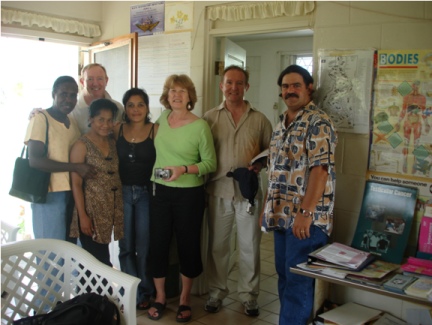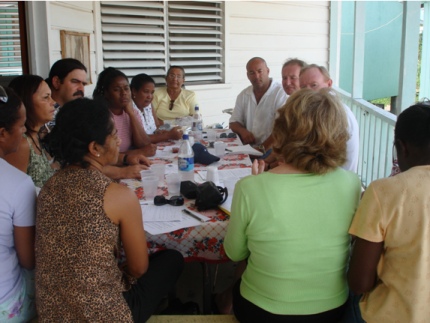IAHPC Traveling Fellowship Report
Report on the Activities of a Canadian Palliative Care Team’s visit to Belize
Dr. Douglas McGregor and Nurse Pat Porterfield traveled from Canada to Belize on the 27th March, 2007. The travel was supported by a Traveling Fellowship grant from the International Association for Hospice and Palliative Care (IAHPC). After lunch
they met with the Director of Medical Services, Dr. Khalid Ghazy, of the Karl Heusner Memorial Hospital, which is the nation’s largest public hospital. They discussed palliative care in the hospital setting with Dr. Ghazy. They reviewed strategies to improve public awareness and to “sell” the
concept to the minister of health.
We visited Belmopan on March 28th to participate in a meeting with the following representatives from the ministry of health: Dr. Natalia Beer technical advisor and chairperson of the National Committee for Control of Cervical-Uterine Cancer, Dr. Peter Allen director of policy analysis
and planning unit, Dr. Ayala epidemiologist, Ms. Sharon Sanchez chief pharmacist, Dr. Mendez-Sosa, and Dr. Larrieu. We were later joined by Ms. Cynthia Guild the chairperson of the nursing faculty at the University of Belize.
The discussion revolved around acquiring oral opioids for the country of Belize. At this meeting it was decided that we would subsequently meet with Ms. Sharon Sanchez and determine which oral opioids should be incorporated into the national formulary. Other areas that were addressed
were the establishment of a national cancer registry, capacity building, establishing a bridge with Canada so that our technical people could travel to Canada for training in the administration of chemotherapeutics and palliative care. We also discussed ways of incorporating palliative
care into the nursing curriculum in Belize using teaching material and the experiences from Canada.
The following day they participated in a morning clinic for our terminally ill patients who were very grateful for Dr. McGregor’s expertise and gentle way he took care of them. During the afternoon, the first lectures were given by Nurse Porterfield
and Dr. McGregor to a packed room of health care professionals. It was an interactive session and a learning experience for both parties.
On March 30th another clinic was held for the terminally ill who had gynecological cancers. Dr. McGregor and Nurse Porterfield also visited the OB/GYN ward to attend two patients with far advanced breast and cervical cancer. The nurses on
this ward also learned about the importance of effective symptom management. One of the patients had all the symptoms which needed urgent attention including spinal cord compression and pain which was not controlled due to lack of proper and regular medication dosing. Again it was
a learning experience for the nurses and doctors who were attending on this ward. I think they changed their views about the rights of terminally ill patients to be comfortable and symptom free.
During the afternoon, lectures were given on pain management and again the room was packed with nurses, nursing students, pharmacists, medical practitioners and anesthesiologists who came from all over the country. The ministry of health tried very hard to have most of the rural health
care professionals present at these lectures.
Again it was very enlightening to hear what Dr. McGregor had to say to us and he gave us his written lectures to distribute to all health care professionals in Belize. It was not a one-sided lecture, because the doctors and nurses were able to ask questions about their fears pertaining
to drug addiction, respiratory depression, use of pethidine, and issues of whether a nurse, in the rural setting, should administer strong opioids to their patients.
The weekend finally arrived and Dr. McGregor and Nurse Porterfield were sent by the ministry of health, in collaboration with the Belize Cancer Society, to the South (Stann Creek). Dr. Mendez-Sosa and myself accompanied them to a palliative care
clinic that was organized by the chief of staff and anesthesiologist, Dr. Melissa Espat, for the unfortunate patients in this area. In January, Tramadol tablets had been sent to Dr. Espat to be given to these patients. I think it was very rewarding for Dr. McGregor to
hear one of the patient express her gratitude for the availability of doctors like him who empathize, treat and care for the forgotten and neglected patients like her in Belize.

At the village clinic, from left to right:
Nurse August, Dr. Peter Allen, Dr. Thompson, Dr. Mendez-sosa, Nurse Porterfield Dr. McGregor, Dr. Alexis Caballero
We then drove to Placencia where the villagers had already made plans for us to meet with their doctor, the village council and a family that had just lost a husband and father to prostate cancer. At this meeting we were joined by Dr. Peter Allen,
from the ministry of health and Dr. Aronian, a retired surgeon from the USA. Discussions revolved around the population size of the village, the number of cancer patients the doctor will soon have as terminally ill (twenty-one), accessibility to opioids and other drugs for symptom
management and the formation of a hospice center at the village. This would be the first pilot project of the ministry of health to start a well defined hospice center with major involvement of the community. The community has already targeted the site where the center will be built
and started the acquisition of materials and the involvement of the National Health Insurance program of the government of Belize. Once this project takes off and becomes successful it will be extended to other villages and hopefully the whole country. It may take on a pattern of
home –based
care initially, but eventually each village will have a place where the terminally ill patients will be able to have quality inpatient care. Doctors and nurses will receive training via teleconferencing and regular CMEs from experts such as Dr. Larrieu, Dr. Mendez-Sosa, and Dr. Espat,
etc.
We also discussed that a branch of the Belize Cancer Society be opened in this village so that the ministry of health would have access to a referral center and the community would have a means to organize a fight against cancer in the village.

Clockwise: Chairperson of village council, Dr .Mcgregor , Dr. Allen, Nurse August , Nurse Porterfield, Dr. Thompson, Ms. Leslie, Ms. Caballero, Dr. Alexis Caballero (village doctor) the other ladies are village councilors
Back in Belize City early Monday morning, Nurse Porterfield and Dr. McGregor met with Dr. Pedro Arriaga who is the only doctor in the city who cares for HIV/AIDS patients. At 2 p.m. we met for a lecture on management of the patients with HIV/AIDS. I must point out that there may still
be a taboo, or degree of discrimination, for persons living with HIV. The lecture was poorly attended, but in spite of this, the few that did attend were able to have an interactive session with Dr. McGregor and Nurse Porterfield.
Tuesday the 3rd of April was our last day with our Canadian guests. Both participated at rounds on the medical ward with Dr. Godinez (internist) and Dr. Arriaga, along with interns, nurses and general practitioners. Again it was a positive learning experience for our health care professionals
who learned about the management of terminal non-cancer patients.
The afternoon session was again an interactive session where doctors exchanged views with Dr. McGregor and Nurse Porterfield about gastrointestinal symptoms. At 8 p.m. Dr. Mendez-Sosa and I met for the last time with our guests for dinner where we discussed the events of the past week
and asked them to forward recommendations to the ministry of health of the government of Belize.
Liliana and all the people of IAHPC, I thank you very much for sending Dr. McGregor and Nurse Porterfield to help us champion the rights of terminally ill patients to have a better quality of life. A million thanks to Dr. Douglas McGregor and Nurse Pat Porterfield for giving of their
time away from family and comfort.
Thanks also to the ministry of health of Belize for facilitating the Canadian team here in Belize, and most of all for their avid interest in the care of this type of patient.
May God bless you all for the wonderful work that you do.
Dr. Beatriz Thompson
Belize City, Belize
Top of Page |



